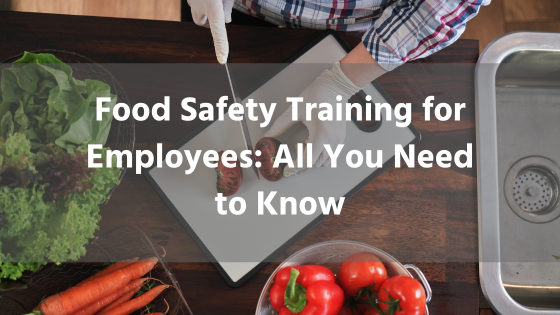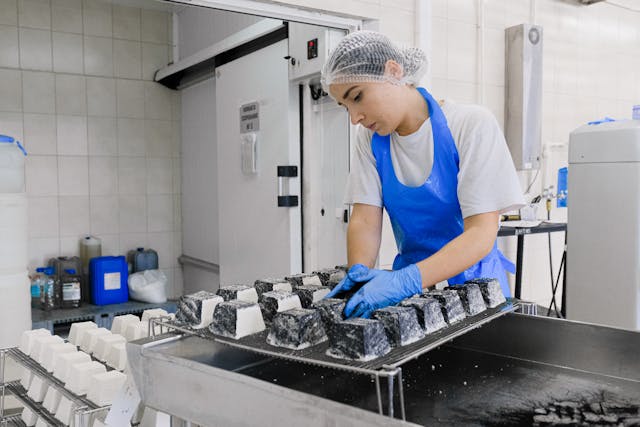
Key Takeaways
- Food safety training is essential to prevent contamination, protect public health, and ensure regulatory compliance across all roles involved in food handling.
- Effective training programs should assess workplace risks, include multilingual and blended (online + in-person) learning, and ensure employees are certified and regularly refreshed on safety procedures.
- Building a food safety culture—where safe practices are reinforced daily and threats like food fraud are taken seriously—helps protect both consumers and a business’s reputation.
What could go wrong if just one food worker doesn’t follow proper safety procedures? The answer is simple: a single mistake in food handling can cause serious illness, damage a business’s reputation, or even lead to legal consequences. That’s why food safety training is important and a necessity.
Food businesses must ensure that all employees understand and follow the correct food safety procedures. From restaurants to catering services to food processing plants, proper training helps prevent contamination, protects consumers, and maintains compliance with regulations.
Greasecycle put together this article to help you understand everything you need to know about food safety training for employees, from basic concepts to long-term strategies.
LEARN MORE ABOUT OUR TRUSTED TEAM
Understanding Food Safety Training
What Is Food Safety Training?
Food safety training is the process of teaching employees how to handle, prepare, store, and serve food safely.
The goal is to prevent foodborne illnesses, maintain cleanliness, and ensure proper hygiene during all stages of food handling. It covers topics such as personal hygiene, temperature control, cleaning methods, cross-contamination, and proper storage practices.
Who Needs Food Safety Training?
Everyone involved in the handling of food should receive food safety training. This includes kitchen staff, servers, delivery drivers, supervisors, and even temporary or seasonal workers.
Even non-kitchen staff who work around food or food equipment should have at least basic awareness training. Regardless of the job title, if someone has a role in the food chain, they need to understand how to avoid safety risks.

Why Food Safety Training Matters
Why Is Food Safety Training Essential for Employees?
Training ensures that employees know how to protect food from contamination. Without proper knowledge, workers may unknowingly spread bacteria or mishandle food products, which can result in foodborne illnesses. These illnesses can harm customers and bring financial and legal trouble to the business.
Aside from health concerns, food safety training helps businesses meet regulatory requirements. Health inspections and audits can lead to penalties if employees are not properly trained.
With proper training, staff can work confidently, knowing they are following the right procedures and supporting the company’s commitment to safe food practices.
How to Build an Effective Training Program
Assess Food Safety Risks
Before starting any training program, assess the specific risks in your workplace. Look at each step in your food preparation process and identify where contamination or errors could occur. This helps you tailor training to your environment, ensuring it is practical and relevant.
Offer Multilingual Training Options
Workplaces often include employees from different language backgrounds. Providing training materials in multiple languages ensures everyone understands the content.
Language should never be a barrier to learning how to handle food safely. When employees fully understand the training, they are more likely to follow procedures correctly.
FIND OUT MORE ABOUT COMMERCIAL WASTE DISPOSAL
(919) 817-6792 Commercial Waste Disposal & Processing
Integrate Online and In-Person Sessions
A mix of online learning and in-person training can be more effective than one method alone. Online modules can cover the basics, allowing employees to learn at their own pace.
In-person training provides hands-on experience and allows for real-time questions and feedback. Combining both ensures that all learning styles are addressed.

Ensure Employee Certification
In many regions, food handlers are required to have official certification. Certification confirms that an employee understands core food safety principles.
Make sure your staff completes accredited programs and keeps their certificates up to date. It also demonstrates to customers and health inspectors that your business takes food safety seriously.
Schedule Regular Refresher Trainings
Food safety training needs to be ongoing. As time passes, employees may forget proper procedures or fall into unsafe habits.
Regular refresher training helps reinforce knowledge and address any new safety regulations. It also allows you to update your program as your business grows or changes.
Building a Long-Term Safety Culture
Promote a Strong Food Safety Culture
Creating a food safety culture means making safe practices part of everyday work life. Management must lead by example and show that food safety is a top priority.
Encourage open communication, where employees feel comfortable reporting problems without fear. Reward safe behaviors and keep safety a topic of daily discussion.
When food safety is part of your company culture, employees are more likely to take it seriously. It becomes a shared responsibility, not just a box to check during training.
Raise Awareness of Food Fraud and Defense
Food fraud is the act of intentionally tampering with food products, often for economic gain. Food defense focuses on preventing intentional contamination by malicious actions.
While these risks may seem unlikely, they can have serious consequences. Training employees to recognize and report suspicious activities helps prevent such threats.

Staff should understand how to identify unusual behavior, spot signs of tampering, and follow proper reporting procedures. This level of awareness helps protect not just your customers, but also your brand and business reputation.
Bottom Line
Food safety training is essential for any business involved in preparing or serving food. It helps prevent contamination, protects consumers from illness, ensures compliance with regulations, and promotes a culture of safety.
From assessing your specific risks to offering regular refresher courses and promoting food defense awareness, every part of the training process plays a role in building a safe and responsible workplace.
GreaseCycle can support your food safety goals by helping your team maintain a clean and compliant kitchen environment.
From grease trap maintenance to waste management, we help reduce contamination risks and support your efforts to build a strong food safety culture. Contact Greasecycle today to learn how we can partner with you to create a cleaner, safer kitchen for both your employees and your customers.




